unit2.2
unit 2 单词(完整)
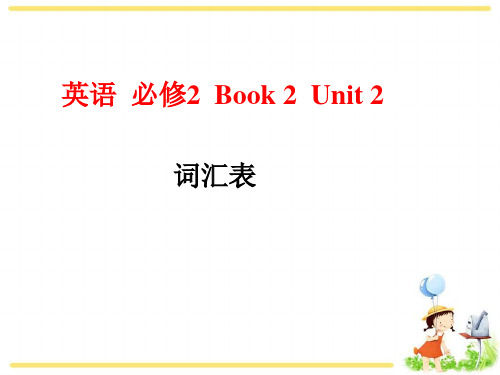
1.容许,准许……进(加)入 a.Only one hundred boys are admitted to/into
the school every year.
每年学校准许100名男生入校。
b.He is admitted as a member of the basketball team.
他被接受成为篮球队的一名队员。
4. take part in 参加;参与
They often _____ take _____ part ____ in outdoor
activities.
他们经常参加室外活动。
take part in join in join
参加活动,并在其中起 积极作用 参加小规模的活动如 “球赛、游戏”等 加入某人或某个组织成 为其中一员 参加会议、婚礼、典礼; 听报告、讲座
英语 必修2 Book 2 Unit 2
词汇表
1. ancient ['eɪnʃ(ə)nt] adj. 古代的.古老的 2. compete [kəm'piːt]vi. 比赛;竞争
petitor [kəm'petɪtə]n. 竞争者
The cycle of learning vi. 比赛;竞赛 compete [kəmˈpi:t] competitive [kəmˈpetətɪv] adj.竞争的 n. 比赛,竞赛 competition [ˌkɒmpəˈtɪʃn]
stand by sb.
反对
支持某人
辞职
stand out stand against
stand down
袖手旁观,支持
显眼,突出
7. △ mascot ['mæ skɒt] n 吉祥物
Unit 2 课文翻译
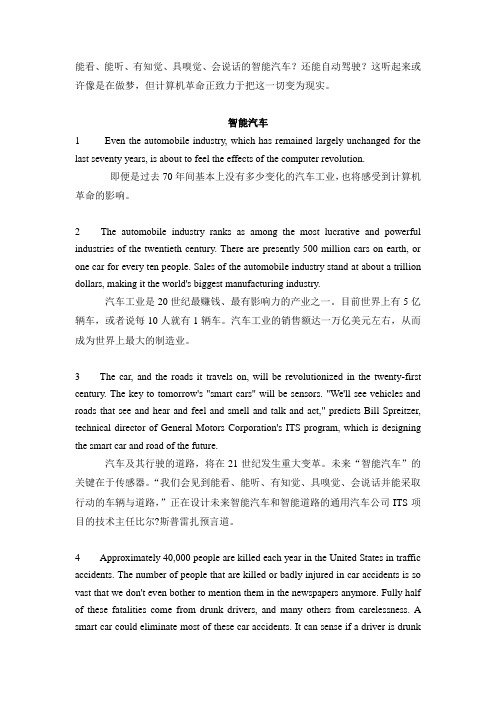
能看、能听、有知觉、具嗅觉、会说话的智能汽车?还能自动驾驶?这听起来或许像是在做梦,但计算机革命正致力于把这一切变为现实。
智能汽车1 Even the automobile industry, which has remained largely unchanged for the last seventy years, is about to feel the effects of the computer revolution.即便是过去70年间基本上没有多少变化的汽车工业,也将感受到计算机革命的影响。
2 The automobile industry ranks as among the most lucrative and powerful industries of the twentieth century. There are presently 500 million cars on earth, or one car for every ten people. Sales of the automobile industry stand at about a trillion dollars, making it the world's biggest manufacturing industry.汽车工业是20世纪最赚钱、最有影响力的产业之一。
目前世界上有5亿辆车,或者说每10人就有1辆车。
汽车工业的销售额达一万亿美元左右,从而成为世界上最大的制造业。
3 The car, and the roads it travels on, will be revolutionized in the twenty-first century. The key to tomorrow's "smart cars" will be sensors. "We'll see vehicles and roads that see and hear and feel and smell and talk and act," predicts Bill Spreitzer, technical director of General Motors Corporation's ITS program, which is designing the smart car and road of the future.汽车及其行驶的道路,将在21世纪发生重大变革。
Unit 2 知识点提要

8A Unit 2 知识点提要一、词汇1.广告可n. advertisement ▲(an/-s)2.英国的adj. British3.美国的adj. American4.饼干可n. <英> biscuit (a/-s)、<美> cookie (a/-s)5.卡车可n. <英>*lorry ▲(a/lorries)、<美> truck (a/-s)6.橡皮可n. <英> rubber (a/-s)、<美>eraser ▲(an/-s)7.足球可n. <英> football (a/-s)、<美> *soccer (a/-s)8.假期可n. <英> holiday (a/-s)、<美> vacation (a/-s)9.秋天可n. <英> autumn (a/-s)、<美> fall (a/-s)下落;跌倒;倒塌↓v. fall→三单:-s →▲过去式:fell →▲现分:-ing10.商店可n. <英> shop (a/-s)、<美> store (a/-s)11.院子可n. <英> garden (a/-s)、<美> y ard (a/-s)12.电影可n. <英> film (a/-s)、<美> movie (a/-s)[典型例题]( ) 1. People in the UK say biscuit while people in the USA say ______.A. cakeB.cookieC.eraserD.soccer( ) 2. Which sentence is likely (可能) to be spoken by Americans?A. David Beckham is a popular soccer star.B. The shop sells different kinds of biscuits.C. It doesn’t rain often in this city in autumn.D. The film is very popular.( ) 3. If you are an Englishman, you may say “__________ ”A.I want some cookies.B. Autumn is coming.C. Can I borrow your eraser?D. He often plays soccer with his friends.13.男女混合的,混合的adj. *mixed★一所混合学校a mixed school混合v.8AU4mix →▲三单:-es →过去式:-ed →现分:-ing把A与B混合mix A with B把...混合在一起8AU4mix ... together14.法语不可n. &法国人可n.(a/-s) &法国(人)的adj.8BU4French法国可n. France (a/-s) 常用单数15.外国的adj. foreign (not in or from your own country)外国人可n. foreigner (a/-s)16.语言可n. language (a/-s) (words used in speaking and writing)区分:青少年可n. *teenager (a/-s)17.在…期间prep. during18.讨论,议论v. discuss (talk about something)→▲三单:-es →过去式:-ed →现分:-ing★与某人讨论某事discuss sth. with sb.讨论可n.8BU5 discussion (a/-s)19.在课堂上(短语)in class20.<口>家伙可n. *guy (a/-s)21.<口>好朋友;搭档可n.*buddy ▲(a/buddies)22.主动提出,自愿给予v. offer (give something to someone)→三单:-s →过去式:-ed →现分:-ing★为某人提供某物(2种)offer sth. to sb.= offer sb. sth.★给某人某物(2种)give sth. to sb.= give sb. sth.23.结束v. end →三单:-s →过去式:-ed →现分:-ing终止;末尾;终点可n.7BU8end (a/-s)24.棒球可n. baseball (a/-s)25.赢得;赢,获胜v. win (be best or first in a competition)→三单:-s →▲过去式:won →▲现分:winning获胜者可n. winner (a/-s)26.最少的;最小的adj. (little的最高级) least27.至少,不少于(短语)at least28.至多,不超过(短语)at most29.较远(的)/更远(的) adj.&adv. (far的比较级) farther/further★further常考固搭(5种)进一步学习/研究further study/ research 进一步讨论further discussion更多的信息further information 其他的问题further questions再往前/下走8BU3further on/ down30.最远(的) adj.&adv. (far的最高级) farthest/furthest31.花费(时间或金钱) v. spend →三单:-s →▲过去式:spent →现分:-ing★★★★★“花费”公式(4种)It/事takes/took sb. 时间段to do sth.人spend(s)/spent时间段/金钱on sth.(in) doing sth.人pay(s)/paid(金钱)for sth.物cost(s)/cost sb. 金钱(A.takes; spendsB. takes; costsC. costs; costsD. spends; takes( )2. [基础题]The trip to the zoo _______ us about one hour by underground yesterday.A. paidB. tookC. spentD. cost( )3. [易错题]This dress is too expensive, it ____ me 2000 yuan.A.takesB. spendsC. paysD. costs( )4. [难题]He tries to spend as much time as he can ____ computer games.A. playB. playsC. playingD.to play32.制服可n. *uniform ★(a/-s)穿校服wear a school uniform= wear school uniforms33.国际象棋不可n. chess34.每日的,日常的adj.&日报n. daily35.每周的adj. weekly36.快的adj. quick 比较级:-er 最高级:the -est快地adv. quickly比较级:more ~ 最高级:the most ~慢的adj. slow 比较级:-er 最高级:the -est慢地adv. slowly比较级:more ~ 最高级:the most ~37.自始至终,从头到尾&(内部)穿过7BU6 prep. th r ough区分:though/although prep. 尽管thought v. 认为(think的过去式)38.浏览,快速查看(短语)look through39.真实的,真的adj. real真实地;确实,的确adv. really40.起初,首先(短语)at first41.继续/重复做某事(短语)keep (on) doing sth.[拓展] “继续做某事”(4种)keep (on) doing sth.= continue doing sth.= carry on doing sth. = carry on with sth.42.完成;结束v. finish →▲三单:-es →过去式:-ed →现分:-ing★完成做某事finish doing sth.43.午餐时间不可n. lunchtime★在午餐时间at lunchtime44.物理(学) 不可n. physicsPhysics _______ (be) a useful subject, the student must learn it wisely and well.45.羽毛球运动不可n. *badminton[总结] ★★★常考冠词题play+球类、棋、牌、中国乐器 e.g. play baseball/badminton/chess/cards/erhu(二胡) play the+西洋乐器 e.g. play the piano/violin/guitar/drums(鼓)46.理想的adj. *ideal★一所理想的学校an ideal school区分:想法,主意,思想可n. idea▲(an/-s)二、语言点1.(某人)为什么不做某事Why don’t/doesn’t/didn’t sb do sth. =why not do sth.2.like作动词意为“喜欢”,作介词意为“像”(无时态、人称、数的变化)be like 像;look like 看起来像像做某事be like doing sth.—What is your school life like?—It is like _______ (live) in a big garden.( ). Tom, _____ his brother, _____ playing basketball after school.A.like; likesB. like; likeC. likes; likesD. likes; like3.little “几乎没有”,修饰不可n. a little “有一些”,修饰不可n.few “几乎没有”,修饰可n.复 a few“有一些”,修饰可n.复4.你想要做某事吗?Would you like to do sth. ?肯定回答:Yes, I’d like/love to. 否定回答:I’d like/love to, but……5.做某事玩得开心have a good/great/nice/lovely/wonderful/fantastic time doing sth.有很多much/lots of/a lot of没有have no有更多时间做某事more time to do sth.有更少less有一段some time[典型例题]( )1. —Hey, guys. Do you often have a good time _____ after-school activities?—Of course, we do. And we always have a lot of time_____ soccer.A. to do; to practiseB. doing; to practiseC. to do; practisingD. doing; practising( )2.Amy had a lovely time ____ one place after another in Shanghai and she had much time _____ the city.A. to visit; to enjoyB. visiting; to enjoyC. to visit; enjoyingD. visiting; enjoying( )3.Linda had a great time ____ with her friends, and they also had some time ____ about their studies last weekend.A.to talk; to talkB. to talk; talkingC. talking; to talkD. talking; talking6.练习做某事practice doing sth.( )1. My brother enjoys __________ the piano in the music room.A.practice playingB. practice playC. practicing playingD. practice to play( )2. The two girls always have a good time ________ the piano together.A.practice to play B.to practice to play C.to practice playing D.practicing playing( )3. [难题]We should spend as much time as we can __________ English every day.A. practice speakingB. practice to speakC. on practicing speakingD. practicing speaking7.给某人买某物buy sth. for sb.= buy sb. sth.8.在几年级(2种)in Year/Grade+基数词= in the+序数词+year/gradee.g. 在八年级______________________= ______________________(思考:如果改用阿拉伯数字呢?)9.单个动名词作主语,谓语动词用单数As we all know, using public chopsticks ________ (be) necessary when we eat with others.10.“借”(3种)borrow/borrowed 借入borrow sth. from sb.从某人那借来某物lend/lent 借出lend sth. to sb.= lend sb. sth.把某物借给某人keep/kept 借用keep sth. for+时间段借用某物一段时间How long提问①(for)+时间段①since +时间点①since 从句How soon提问in +时间段How far提问路程①实际距离 e.g.500 metres①s’ walk/ ride /drive /flight(航行) /bus ride /car ride/ train ride①时间段+交通方式e.g. 15 minutes by bus How often提问频率①次数+a+时间单位 e.g. twice a week①every+时间单位 e.g. every day③频度副词7个:always总是、usually通常、often经常、sometimes有时、seldom很少、hardly几乎不、never从不( )1—How far is it from your home to your school? —________.A.On foot B.I can take a bus there C.It’s about half an hour D.About ten minutes’ walk( )2.— How long have you had the bike? — ______ two years. A.in B.until C.since D.for ( )3.— How soon will these waste bottles be recycled?—_________. I have called the recycling company. A.For an hour B.An hour ago C.After an hour D.In an hour( )4.—_________ do you go to the concert? — Always, because I’m interested in it.A.How longB. How soonC. How oftenD. How far( )5. —________ is it from here to your home town? — Well, it takes over three hours to get there by coach. A. How soon B. How much C. How long D. How far( )6.—________do you have after-school activities? —Twice a week.A.How long B.How far C.How often D.How soon( )7. [易错题]—________ do you hear from your parents a week? —At least twice a week.A. How many timesB. How soonC. How oftenD. How long12.一篇由一个美国男孩写的文章an article (written) by a boy from the USA13.the number of…“…的数量”作主语,谓V.用单数;a number of…“许多”作主语,谓V.用复数( ). —A number of volunteers ________ willing to teach in China’s rural areas(农村地区).—Yes, the number of them _______ getting ________.A. is; are; more and moreB. are; is; larger and largerC. is; is; bigger and biggerD. is; are; more and more14.提问数量的句型(2种)What’s the number of the students in your class?=How many students are there in your class?15.seem“似乎”用法(3种)①seem (to be)+adj. ②seem to do sth. ③It seems that+从句16.[难点]need作动词的2种用法若need是情态动词,need do sth. ; 若need是实义动词,need to do sth.解题关键:如何判断need是情态动词还是实义动词?法一:看三单__________________ 法二:看否定__________________ 法三:看提问__________________ ( )1. Millie ______ her homework at the moment.A. needs not finishB. doesn’t need finishC. need not to finishD. doesn’t need to finish( )2. You needn’t ______ those things if you ______ them.A.buy; needn’tB.to buy; don’t needC.buy; don’t needD.to buy; needn’t( )3. —Does he need ______ there at once ? —No, he ______ leave so hurriedly because he has enough time.A. to go; needB. go; needn’tC. to go; needn’tD.go; doesn’t need17.代词it/one(s)的区分:it同类且同物、one(s)同类不同物( ). —The black dress doesn’t look nice on me. I don’t like _____ at all. —How about the blue _____?A.one; one B.it; one C.it; it D.one; it18.Each of(√);every of(×)19.Each of us ________(have) a book. We each ________(have) a book.20.有一个星期的假期have a week off21.★对每科进行一次月考have a monthly test on each subject22.我的日常生活my daily life23.有很多时间参加课外活动have lots of time for after-school activities24.★有一小时的家庭作业have an hour of homework25.★进行一次学校旅行(2种)go on/for a school trip26.★停止做某事(同一件事)stop doing sth. 停下来去做某事(另一件事)stop to do sth. ( )1. We have worked so long. Let’s stop ______ a rest.A.have B.to having C.having D.to have( )2.My father told me a funny joke and I can’t stop ________ every time I think of it.A.to laugh B.laughing C.from laughing D.Laughmore+可n.复/不可n.+than 比…多less+不可n.+than 比…少fewer+可n.复+than 比…少the most+可n.复/不可n.最多the least+不可n.最少the fewest+可n.复最少。
unit 2(新探索研究生英语)

unit 2(新探索研究生英语)
《新探索研究生英语》是为非英语专业研究生开设的英语课程,旨在提高学生的英语应用能力和跨文化交际能力,培养具有国际视野和跨文化交际能力的高层次人才。
该课程包括听、说、读、写、译等方面的教学内容,注重培养学生的实际语言运用能力和跨文化交际能力。
通过课堂教学、研讨、实践活动等多种形式,鼓励学生积极参与、主动思考,提高其英语表达和交流能力。
此外,《新探索研究生英语》还注重培养学生的批判性思维和创新能力,鼓励学生独立思考、勇于探索,培养其创新意识和跨学科视野。
同时,该课程还注重培养学生的跨文化意识和跨文化交际能力,通过引入不同文化背景的素材和案例,帮助学生了解不同文化之间的差异和共性,提高其跨文化交际能力。
总之,《新探索研究生英语》是一门综合性、实用性和人文性相结合的英语课程,注重培养学生的英语应用能力和跨文化交际能力,有助于提高学生的综合素质和未来的职业发展。
Unit 2单词
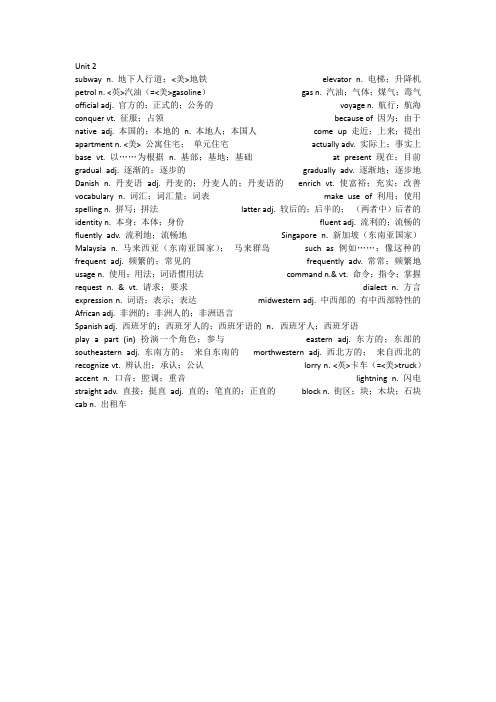
Unit 2subway n. 地下人行道;<美>地铁elevator n. 电梯;升降机petrol n. <英>汽油(=<美>gasoline)gas n. 汽油;气体;煤气;毒气official adj. 官方的;正式的;公务的voyage n. 航行;航海conquer vt. 征服;占领because of 因为;由于native adj. 本国的;本地的n. 本地人;本国人come up 走近;上来;提出apartment n. <美> 公寓住宅;单元住宅actually adv. 实际上;事实上base vt. 以……为根据n. 基部;基地;基础at present 现在;目前gradual adj. 逐渐的;逐步的gradually adv. 逐渐地;逐步地Danish n. 丹麦语adj. 丹麦的;丹麦人的;丹麦语的enrich vt. 使富裕;充实;改善vocabulary n. 词汇;词汇量;词表make use of 利用;使用spelling n. 拼写;拼法latter adj. 较后的;后半的;(两者中)后者的identity n. 本身;本体;身份fluent adj. 流利的;流畅的fluently adv. 流利地;流畅地Singapore n. 新加坡(东南亚国家)Malaysia n. 马来西亚(东南亚国家);马来群岛such as 例如……;像这种的frequent adj. 频繁的;常见的frequently adv. 常常;频繁地usage n. 使用;用法;词语惯用法command n.& vt. 命令;指令;掌握request n. & vt. 请求;要求dialect n. 方言expression n. 词语;表示;表达midwestern adj. 中西部的有中西部特性的African adj. 非洲的;非洲人的;非洲语言Spanish adj. 西班牙的;西班牙人的;西班牙语的n.西班牙人;西班牙语play a part (in) 扮演一个角色;参与eastern adj. 东方的;东部的southeastern adj. 东南方的;来自东南的morthwestern adj. 西北方的;来自西北的recognize vt. 辨认出;承认;公认lorry n. <英>卡车(=<美>truck)accent n. 口音;腔调;重音lightning n. 闪电straight adv. 直接;挺直adj. 直的;笔直的;正直的block n. 街区;块;木块;石块cab n. 出租车。
unit 2知识点
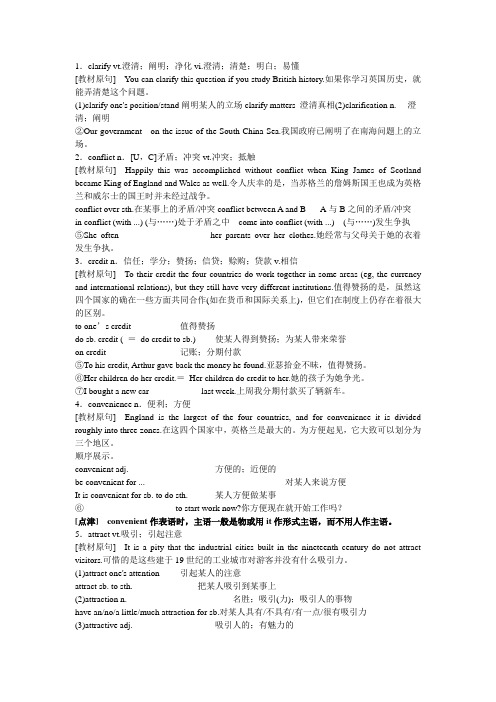
1.clarify vt.澄清;阐明;净化vi.澄清;清楚;明白;易懂[教材原句]You can clarify this question if you study British history.如果你学习英国历史,就能弄清楚这个问题。
(1)clarify one's position/stand阐明某人的立场clarify matters 澄清真相(2)clarification n. 澄清;阐明②Our government on the issue of the South China Sea.我国政府已阐明了在南海问题上的立场。
2.conflict n.[U,C]矛盾;冲突vt.冲突;抵触[教材原句]Happily this was accomplished without conflict when King James of Scotland became King of England and Wales as well.令人庆幸的是,当苏格兰的詹姆斯国王也成为英格兰和威尔士的国王时并未经过战争。
conflict over sth.在某事上的矛盾/冲突conflict between A and B A与B之间的矛盾/冲突in conflict (with ...) (与……)处于矛盾之中come into conflict (with ...) (与……)发生争执⑤She often her parents over her clothes.她经常与父母关于她的衣着发生争执。
3.credit n.信任;学分;赞扬;信贷;赊购;贷款v.相信[教材原句]To their credit the four countries do work together in some areas (eg, the currency and international relations), but they still have very different institutions.值得赞扬的是,虽然这四个国家的确在一些方面共同合作(如在货币和国际关系上),但它们在制度上仍存在着很大的区别。
大学英语教材unit2
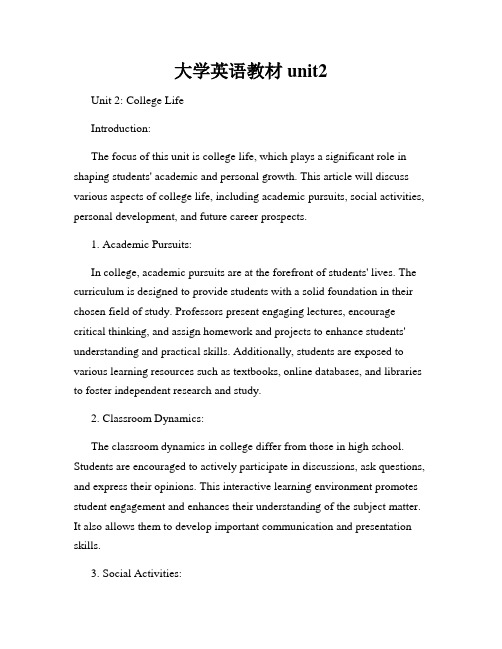
大学英语教材unit2Unit 2: College LifeIntroduction:The focus of this unit is college life, which plays a significant role in shaping students' academic and personal growth. This article will discuss various aspects of college life, including academic pursuits, social activities, personal development, and future career prospects.1. Academic Pursuits:In college, academic pursuits are at the forefront of students' lives. The curriculum is designed to provide students with a solid foundation in their chosen field of study. Professors present engaging lectures, encourage critical thinking, and assign homework and projects to enhance students' understanding and practical skills. Additionally, students are exposed to various learning resources such as textbooks, online databases, and libraries to foster independent research and study.2. Classroom Dynamics:The classroom dynamics in college differ from those in high school. Students are encouraged to actively participate in discussions, ask questions, and express their opinions. This interactive learning environment promotes student engagement and enhances their understanding of the subject matter. It also allows them to develop important communication and presentation skills.3. Social Activities:Apart from their academic commitments, college students engage in various social activities. These activities create opportunities for students to form friendships, develop social networks, and experience personal growth. Student clubs, cultural events, sports teams, and volunteer activities are popular choices for students to actively participate in their college community.4. Personal Development:College life offers a platform for personal growth and self-discovery. Students gain valuable life skills such as time management, organization, and responsibility as they juggle academics, extracurricular activities, and personal commitments. Living away from home and being independent also fosters self-reliance and decision-making abilities.5. Future Career Prospects:One of the primary goals of college education is to prepare students for their future careers. In addition to academic knowledge, college life offers various opportunities for students to develop professional skills. Internships, career fairs, and networking events provide avenues for students to gain practical experience and establish professional connections. Colleges also offer career counseling and guidance to help students explore different career paths and make informed decisions.Conclusion:College life is a transformative period that shapes students academically, socially, and personally. Through academic pursuits, engagement in social activities, personal growth, and future career prospects, students acquire thenecessary skills and experiences to succeed in their chosen fields. The holistic development offered by college life not only prepares students for their professional lives but also helps them become well-rounded individuals.。
必修二unit2单词表
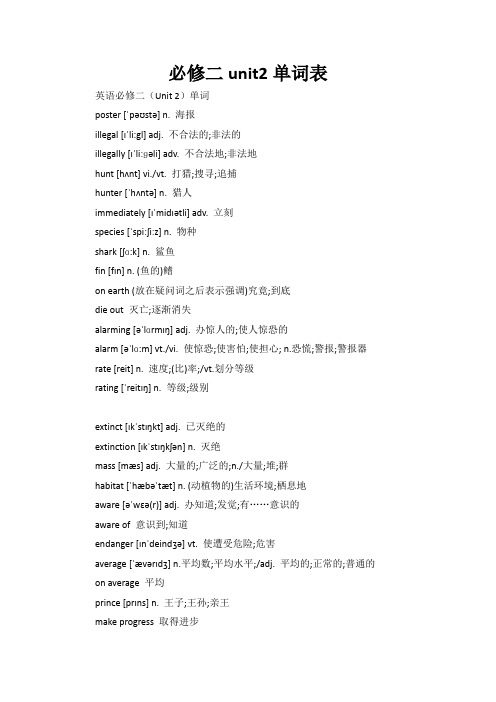
必修二unit2单词表英语必修二(Unit 2)单词poster [ˈpəʊstə] n. 海报illegal [ɪˈli:gl] adj. 不合法的;非法的illegally [ɪˈliːɡəli] adv. 不合法地;非法地hunt [hʌnt] vi./vt. 打猎;捜寻;追捕hunter [ˈhʌntə] n. 猎人immediately [ɪˈmidɪətli] adv. 立刻species [ˈspiːʃiːz] n. 物种shark [ʃɑ:k] n. 鲨鱼fin [fɪn] n. (鱼的)鳍on earth (放在疑问词之后表示强调)究竟;到底die out 灭亡;逐渐消失alarming [əˈlɑrmɪŋ] adj. 办惊人的;使人惊恐的alarm [əˈlɑ:m] vt./vi. 使惊恐;使害怕;使担心; n.恐慌;警报;警报器rate [reit] n. 速度;(比)率;/vt.划分等级rating [ˈreitɪŋ] n. 等级;级别extinct [ɪkˈstɪŋkt] adj. 已灭绝的extinction [ɪkˈstɪŋkʃən] n. 灭绝mass [mæs] adj. 大量的;广泛的;n./大量;堆;群habitat [ˈhæbəˈtæt] n. (动植物的)生活环境;栖息地aware [əˈwɛə(r)] adj. 办知道;发觉;有……意识的aware of 意识到;知道endanger [ɪnˈdeindʒə] vt. 使遭受危险;危害average [ˈævərɪdʒ] n.平均数;平均水平;/adj. 平均的;正常的;普通的on average 平均prince [prɪns] n. 王子;王孙;亲王make progress 取得进步concern [kənˈsɜːn] vt. 涉及;让……担忧concerned [kənˈsɜːnd] adj. 担心的;关切的concerned about 对……关切的;为……担忧的living [ˈlɪvɪŋ] adj. 居住的;活的;在用的;n./生活;生计adapt [əˈdæpt] vi.适应;/vt. 使适应;使适合adapt to 适应measure [ˈmɛʒə] n.措施;方法;/vt. 测量;度量;估量authority [ɔːˈθɒrəti] n. 官方;权威;当权pressure [ˈprɛʃə] n. 压力;要求under pressure 在承受压力whale [wel] n. 鲸antelope [ˈæntɪləʊp] n. 羚;羚类动物Tibetan antelope 藏羚羊reserve [rɪˈzɜːv] n.保护区;储藏(量);/vt. 预订;预留;保留plain [plein] n.平原; /adj. 简单明了的;直率的;平凡的make out 看清;听清;分清herd n.牧群;兽群observe [əbˈzɜːv] n. 观察(到);注视;遵守beauty [ˈbju:ti] n. 美;美人;美好的东西remind [rɪˈmaɪnd] vt. 提醒;使想起remind sb of sb/sth 使某人想起(类似的人或物)fur [fɜː] n. 毛(皮); 毛皮衣服herb [hɜːb] n. 兽群sacred [ˈsekrɪd] adj. s神圣的;受尊敬的shoot [ʃut] vt./vi. (shot,shot) 杀;射伤;发射profit [ˈprɑfɪt] n. 利润;利益watch ove 保护;照管;监督day and night 日日夜夜;夜以继日attack [əˈtæk] n./vi./vt. 攻击;抨击effective [ɪˈfɛktɪv] adj. 有效的;生效的recover [rɪˈkʌvə] vt. 恢复;康复;找回;寻回remove [rɪˈmuv] vt. 去除;移开;脱去intend [ɪnˈtɛnd] vi./vt. 打算;计划;想要threat [θrɛt] n. 威胁threaten [ˈθrɛtn] vt. 威胁;危及exist [ɪɡˈzɪst] vi. 存在;生存harmony [ˈhɑrməni] n.和谐;融洽goods [ɡʊdz] n. 商品;货物creature [ˈkritʃə] n. 生物;动物deer [dɪr] n. 鹿kangaroo [ˌkæŋɡəˈru:] n. 袋鼠reduce [rɪˈdjʊs] vt. 减少due [dju] adj. 由于;因为due to 由于;因为insect [ˈɪnsɛkt] n.昆虫net [nɛt] n.网(=Internet);/adj. 净得的;纯的neighbourhood [ˈneɪbərhʊd] n. 临近的地方;街区binoculars [bɪˈnɑkjəlɚz] n.b双筒望远镜bird field guide 鸟类图鉴search for 捜索;查找dolphin [ˈdɒlfɪn] n. 海豚Yangtze River dolphin 白鳍豚koala [kəʊˈɑ:lə] n. 树袋熊;考拉stir [stɜː] vt. 激发;搅动stir up 激起emotion [ɪˈməʊʃən] n. 感情;情感;情绪skin [skɪn] n. 皮;皮肤unusual [ʌnˈjʊʒʊəl] adj. 特别的;不寻常的Tibetan /tɪ’betn/ adj 西藏的; 藏语的; 藏族(人)的n.西藏人; 藏族人; 藏语Tibet /tɪ’bet/ n.西藏。
英语必修二-Unit2-单元知识点总结
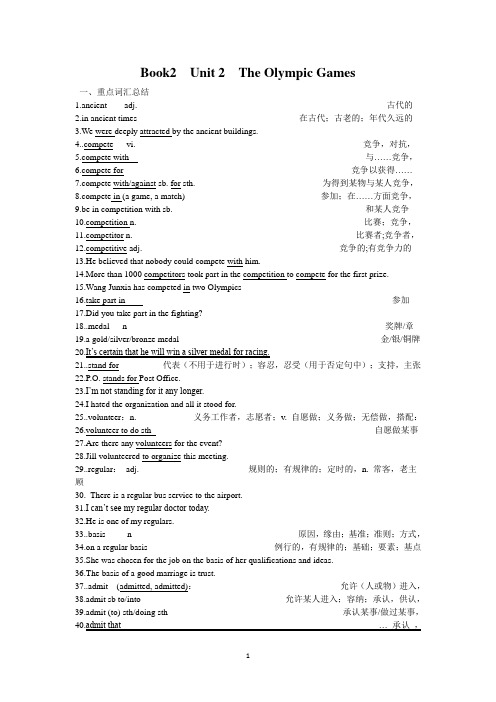
Book2 Unit 2 The Olympic Games一、重点词汇总结1.ancient adj. 古代的2.in ancient times 在古代;古老的;年代久远的3.We were deeply attracted by the ancient buildings.pete vi. 竞争,对抗,pete with 与……竞争,pete for 竞争以获得……pete with/against sb. for sth. 为得到某物与某人竞争,pete in (a game, a match) 参加;在……方面竞争,9.be in competition with sb. 和某人竞争petition n. 比赛;竞争,petitor n. 比赛者;竞争者,petitive adj. 竞争的;有竞争力的13.He believed that nobody could compete with him.14.More than 1000 competitors took part in the competition to compete for the first prize.15.Wang Junxia has competed in two Olympics16.take part in 参加17.Did you take part in the fighting?18..medal n 奖牌/章19.a gold/silver/bronze medal 金/银/铜牌20.It’s certain that he will win a silver medal for racing.21..stand for 代表(不用于进行时);容忍,忍受(用于否定句中);支持,主张22.P.O. stands for Post Office.23.I’m not standing for it any longer.24.I hated the organization and all it stood for.25..volunteer:n. 义务工作者,志愿者;v. 自愿做;义务做;无偿做,搭配:26.volunteer to do sth 自愿做某事27.Are there any volunteers for the event?28.Jill volunteered to organize this meeting.29..regular:adj. 规则的;有规律的;定时的,n. 常客,老主顾30. There is a regular bus service to the airport.31.I can’t see my regular doctor today.32.He is one of my regulars.33..basis n 原因,缘由;基准;准则;方式,34.on a regular basis 例行的,有规律的;基础;要素;基点35.She was chosen for the job on the basis of her qualifications and ideas.36.The basis of a good marriage is trust.37..admit (admitted, admitted):允许(人或物)进入,38.admit sb to/into 允许某人进入;容纳;承认,供认,39.admit (to) sth/doing sth 承认某事/做过某事,40.admit that … 承认,41.admit sb/sth to be adj./n 承认……是……42.The servant opened the door and admitted me into the house.43.Only one hundred boys are admitted to the school every year.44.The theatre admits only 200 persons.45.I admit my mistake.46.He admitted making a big mistake.47.You must admit the task to be difficult.48.as well 也,又,还49.Air is necessary for people; it is necessary for plants as well.50..host :vt. 做东,主办;n. 主人,东道主51.He is willing to host the visitors.52..responsibility:n. 责任,负责53.responsibility for (doing) sth/ to do sth (做)……责任;对……负责54.take responsibility for (doing) sth 对……负责任55. take on the responsibility 承担责任; (n.) 职责;义务;任务56.responsibility to sb 对某人负责,57.responsibility to do sth 做某事的责任,58.a sense of responsibility 责任感,59.responsible adj. 有责任的,有义务的;可信赖的60.They have responsibility for ensuring that the rules are enforced.61.She feels a strong sense of responsibility to help these countries.62.replace vt. 代替,取代,63.replace sth/sb 取代某物/某人,64.replace sth/sb with/by 以……代替某物/某人;替换;65.replace sb/sth = take the place of sb/sth = take sb’s /sth’s place 取代,替代66.Can anything replace a mother’s love?67.If he can’t manage he’ll have to be replaced.68.charge vt. 指控,控告;起诉;指责; 收费,要价,n. 要价,收费,n. 主管,掌管,责任69.charge sb/sth for sth 因……而向某人收费,70.charge sb sth for sth 因……而向某人收……费;71.charge sb with sth 指控某人某事;72.charge sb with doing sth 指控某人做了事;73.free of charge =for free 免费;74.take charge of 负责,掌管,75.in charge of 主管,掌管,76. in the charge of 被掌管77.What did they charge for the repairs?78.He was charged with murder.79.Delivery is free of charge.80.He took charge of the farm after his father’s death.81..fine vt. 罚款,处某人以罚金,n. 罚金,罚款;adj. 可接受的,满意的82.fine sb for sth 因……而罚某人的款;83.He was fined for speeding.84.I’ll leave this here, ok? Fine.85.advertise vt. 为……做广告;登广告,86.advertise sth 登广告宣传某物,87.advertise for sb/sth 为征求……登广告;88.advertisement = ad 广告;89.advertising n. 广告,广告业90.They advertise their new product on TV.91.The company is advertising for typists in the newspapers.92.bargain v. 讨价还价,商讨条件,n.便宜货;n. 协议;交易:93.bargain with sb over/about/for sth 就某物与某人讨价还价;94.make a bargain with sb about sth 与某人就某事/物达成协议95.He was bargaining with the shop owner over the price.96.The car was a bargain at that price.97. one after another 一个接一个地;依次地98.Strange things happened one after another.99. deserve v. (不用于进行时态)值得,应得,应受100.You deserve a rest after all that hard work.101.What have I done to deserve this?注意:deserve后接doing或动名词的主动形式表示被动意义,等于接不定式的被动语态。
仁爱八年级上unit2知识点总结
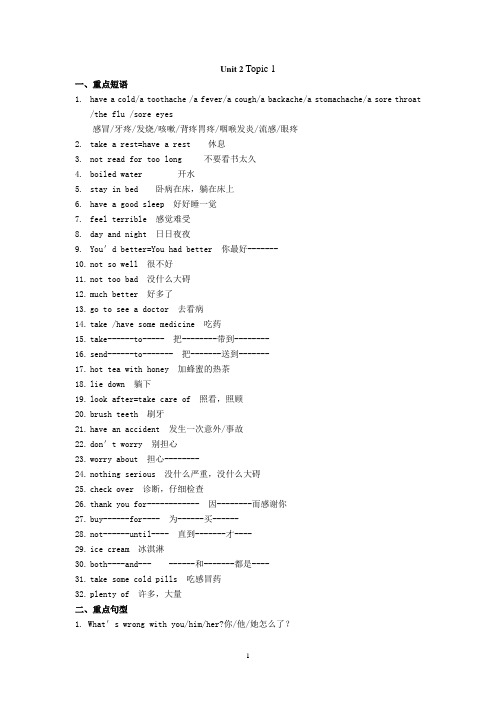
Unit 2 Topic 1一、重点短语1.have a cold/a toothache /a fever/a cough/a backache/a stomachache/a sore throat/the flu /sore eyes感冒/牙疼/发烧/咳嗽/背疼胃疼/咽喉发炎/流感/眼疼2.take a rest=have a rest 休息3.not read for too long 不要看书太久4.boiled water 开水5.stay in bed 卧病在床,躺在床上6.have a good sleep 好好睡一觉7.feel terrible 感觉难受8.day and night 日日夜夜9.You'd better=You had better 你最好-------10.not so well 很不好11.not too bad 没什么大碍12.much better 好多了13.go to see a doctor 去看病14.take /have some medicine 吃药15.take------to----- 把--------带到--------16.send------to------- 把-------送到-------17.hot tea with honey 加蜂蜜的热茶18.lie down 躺下19.look after=take care of 照看,照顾20.brush teeth 刷牙21.have an accident 发生一次意外/事故22.don't worry 别担心23.worry about 担心--------24.nothing serious 没什么严重,没什么大碍25.check over 诊断,仔细检查26.thank you for------------ 因--------而感谢你27.buy------for---- 为------买------28.not------until---- 直到-------才----29.ice cream 冰淇淋30.both----and--- ------和-------都是----31.take some cold pills 吃感冒药32.plenty of 许多,大量二、重点句型1. What's wrong with you/him/her?你/他/她怎么了?同一句:What's the matter with-------?What's the trouble with------?2.You should see a dentist.你应该去看牙医。
七年级上册英语unit2知识点总结
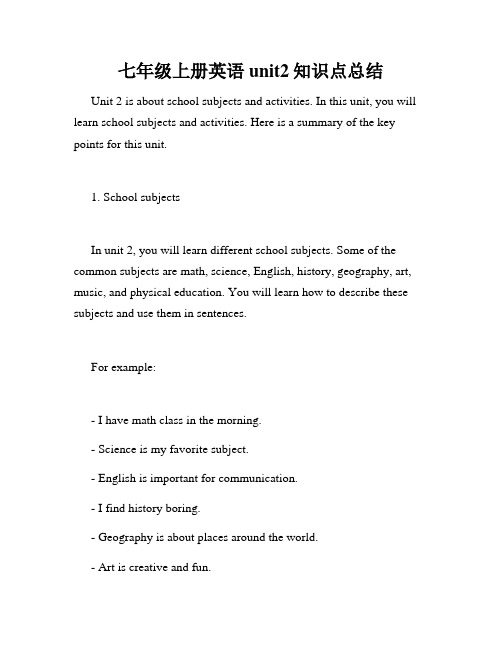
七年级上册英语unit2知识点总结Unit 2 is about school subjects and activities. In this unit, you will learn school subjects and activities. Here is a summary of the key points for this unit.1. School subjectsIn unit 2, you will learn different school subjects. Some of the common subjects are math, science, English, history, geography, art, music, and physical education. You will learn how to describe these subjects and use them in sentences.For example:- I have math class in the morning.- Science is my favorite subject.- English is important for communication.- I find history boring.- Geography is about places around the world.- Art is creative and fun.- Music is enjoyable to listen to and play.- Physical education is good for health and fitness.2. School activitiesIn addition to school subjects, you will also learn about school activities. Some of the common activities are taking notes, doing homework, reading, writing, listening, speaking, and practicing.For example:- I always take notes in class.- I have a lot of homework tonight.- Reading is good for improving vocabulary.- Writing helps to organize thoughts.- Listening is important for understanding.- Speaking is necessary for communication.- Practicing is essential for learning new skills.3. Asking and answering questionsIn this unit, you will also learn how to ask and answer questions. You will learn various question words, such as what, where, why, when, who, and how. You will also learn how to respond to questions with appropriate answers.For example:- What is your favorite school subject?- Where do you have English class?- Why do you like music?- When do you study for exams?- Who is your favorite teacher?- How do you do well in math?4. Present tense verbsFinally, in this unit, you will learn present tense verbs. You will learn how to use verbs with different subjects and how to make negative and affirmative sentences.For example:- I study English every day.- She listens to music in her free time.- They practice sports after school.- We do not like math class.- He does his homework in the library.- You write notes in class.In conclusion, unit 2 covers the school subjects and activities, as well as how to ask and answer questions and use present tense verbs. By learning these key points, you will be able to communicate effectively in English about your school life. Keep practicing and you will improve your English skills in no time!。
Unit 2 知识梳理(课件)高二英语(译林版2020选择性必修第二册)

大致相近的估计 不公正的,伤人的 认输,承认失败
Look and learn
词组积累
be identical to complain about have faith in
与……一致 抱怨…… 对……有信心
Look and learn
词组积累
walk on air
die out make decisions
e elect vt. 挑选、选举 → election n. 选举,推选,当选
Look and learn
词汇积累
f fate n. 命运→faith n.信心;宗教信仰 follow v. 跟随 fellow adj.同伴的,同情况的,同类的
n.同辈,同类;男人,家伙 fist n.拳,拳头
g gradual adj. 逐渐的 → gradually adv.逐渐地,逐步地 great adj. 伟大的 n. 大人物 →grace n. 高雅,文稚;优美;风度,体面
词汇积累
Lc ook and learn
ceed 词根 行走、前进 → proceed vi.接着做,继而做
came来
→ flame n.激情 热情; 火焰,火舌
chair+man
→ chairman n. (委员会的)委员长
constitute vt 组成、构成 → constitution n. 体质,身体,素质;宪法,章程
1.One major disadvantage of the area is the___la_c_k__o_f____ public transport.2. Practice again, so you can respond confidently and____w_i_t_h_o_u_t_h_e_s_it_a_t_io.n3. Thankfully, after I explained my plan to them ____i_n__d_e_ta_i_l_ , they said yes.4. When our first home-made aircraft carrier Shandong ship was delivered to the Navy, all the Chinese people were _w_a_l_k_in_g__o_n_a_i_r.5.When asked why the experiment failed, he____________ the issue ____k__ep__t ____. in perspective
unit2单词
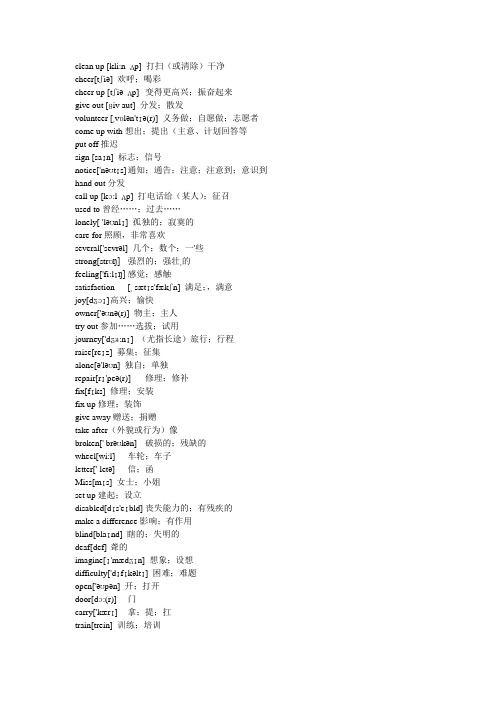
clean up [kli:n ʌp] 打扫(或清除)干净cheer[tʃiə] 欢呼;喝彩cheer up [tʃiəʌp] 变得更高兴;振奋起来give out [ɡiv aut] 分发;散发volunteer [ˌvɒlən'tɪə(r)] 义务做;自愿做;志愿者come up with想出;提出(主意、计划回答等put off推迟sign [saɪn] 标志;信号notice['nəʊtɪs] 通知;通告;注意;注意到;意识到hand out分发call up [kɔ:l ʌp] 打电话给(某人);征召used to曾经……;过去……lonely[ 'ləʊnlɪ] 孤独的;寂寞的care for照顾,非常喜欢several['sevrəl] 几个;数个;一'些strong[strɒŋ]强烈的;强壮ˌ的feeling['fi:lɪŋ]感觉;感触satisfaction [ˌsætɪs'fækʃn] 满足;,满意joy[dʒɔɪ] 高兴;愉快owner['əʊnə(r)] 物主;主人try out参加……选拔;试用journey['dʒɜ:nɪ] (尤指长途)旅行;行程raise[reɪz] 募集;征集alone[ə'ləʊn] 独自;单独repair[rɪ'peə(r)] 修理;修补fix[fɪks] 修理;安装fix up修理;装饰give away赠送;捐赠take after(外貌或行为)像broken[' brəʊkən] 破损的;残缺的wheel[wi:l] 车轮;车子letter[' letə] 信;函Miss[mɪs] 女士;小姐set up建起;设立disabled[dɪs'eɪbld] 丧失能力的;有残疾的make a difference影响;有作用blind[blaɪnd] 瞎的;失明的deaf[def] 聋的imagine[ɪ'mædʒɪn] 想象;设想difficulty['dɪfɪkəltɪ] 困难;难题open['əʊpən] 开;打开door[dɔ:(r)] 门carry['kærɪ] 拿;提;扛train[trein] 训练;培训excited[ɪk' saɪtɪd] 激动的;兴奋的training[' treɪnɪŋ]训练;培训kindness ['kaɪndnəs] 仁慈;善良clever[' klevə] 聪明的;聪颖的understand[ˌʌndə'stænd] 理解;领会change[tʃeɪndʒ] 变化;改变interest['ɪntrəst] 兴趣;关注sir[sɜ:(r)] 先生(用于正式信函中对不知名的男性收信人的称呼时)madam['mædəm] 夫人;女士(用于正式信函中对不知名的女性收信人的称呼时)Mario['mærɪəʊ] 马里奥(男名Jimmy [' dʒimi] 吉米(男名。
九年级英语Unit 2知识点汇总

九年级英语Unit 2知识点汇总九年级英语Unit 2知识点汇总一、重点短语Lantern Festival 元宵节the Dragon Boat Festival 端午节the Water Festival 泼水节eat five meals a day 一天吃五餐put on five pounds 体重增加了五磅lose weight减肥in two weeks 两星期之后be simila与.......相似throw water at ea互相泼水a呈…的形状fol民间传说故事lay out摆开;布置ang,e嫦娥的故事refuse to do sth 拒绝做某事have good luw year在新的一年里有好运气end up最终成为;最后处于 end up with以…结束share sth with sb 与…分享…as a result结果(两者中)一个…另一个…care about 关心20. dress up 乔装打扮haunted house 鬼屋play ab.捉弄某人give out 分发 give up放弃at (万圣节用语)不给糖果就捣蛋light candlance of…的重要性take sb around…=show sb around…带某人到处走走warn sb to do sth.警告某人做某事warn sbdo sth警告某人不要做某事the beginning of new life 新生命的开始remind sb of … 使某人回想起…do sth.承诺做某treat sb. with. 用/以…对待某人二、重点知识点anger用法n. 陌生人 =strange(adj) + (e)r【拓展】异乡人,外地人,新来者I am a strang我不是本地人.2.put on 用法增加体重;发胖; 穿上,戴上((强调动作); 上演,举办. put on 的其他含义:①穿上;戴上uat and went out.②上演;举办One summer our children put on a plaal 用法vt. 偷,窃取 stole—stolen;stealb./sw. 从某人或某地偷某物y out 用法lay out 摆开,布置lay ouw 将某物摆放在某处lay v. 安置,安放, 产卵,下蛋 laid laidlie 平躺 lay lainlie 撒谎 lied lied5. admire 用法vt. 欣赏,仰慕 + sb./sth admire sb./(doing)sth 因(做)某事而佩服/欣赏某人at 不请客就捣蛋花招,把戏play ab. 捉弄某人treat 用法:n. 款待,招待v. 款待,请客It’at. 我请客treat sb请某人吃…看待;当作与as 连用treat… as …把..当作治疗 Which doctors are treatingllness. 为某人治疗7. punish 用法v. 处罚,惩罚 be punished for 因…受惩罚n. puadj. punishable 应惩处的,可依法惩处的warn 用法v 警告,告诫1)warn sb (not) to do sth. 警告,告诫某人做某事2)warn sb. abou提醒/告诫某人注意某事3)warn sb. of/ against (doing) sth . 告诫某人提防某事4)warn (sb.)that从句dead 用法是形容词,意为“死的;失去生命的”,常用于名词前定语或作系动词的表语。
英语八年级下册unti2知识点
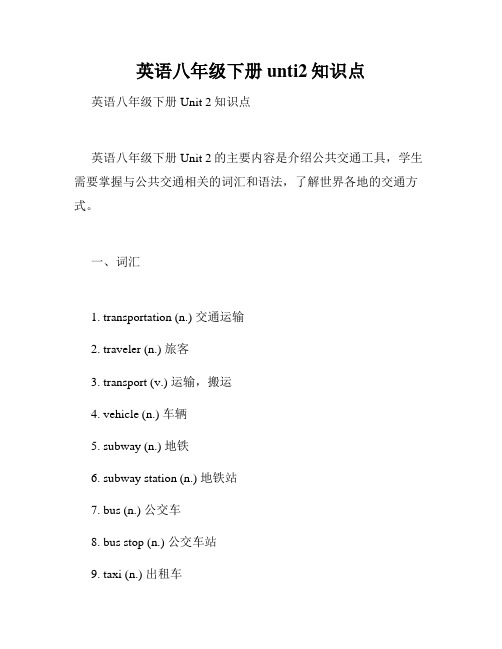
英语八年级下册unti2知识点英语八年级下册Unit 2知识点英语八年级下册Unit 2的主要内容是介绍公共交通工具,学生需要掌握与公共交通相关的词汇和语法,了解世界各地的交通方式。
一、词汇1. transportation (n.) 交通运输2. traveler (n.) 旅客3. transport (v.) 运输,搬运4. vehicle (n.) 车辆5. subway (n.) 地铁6. subway station (n.) 地铁站7. bus (n.) 公交车8. bus stop (n.) 公交车站9. taxi (n.) 出租车10. bridge (n.) 桥11. intersection (n.) 十字路口12. pedestrian (n.) 行人13. traffic light (n.) 交通灯14. highway (n.) 高速公路15. tram (n.) 有轨电车二、语法1. 现在进行时现在进行时用来描述正在进行的动作或状态,结构为 be + 动词+ ing,例如:I am taking the subway to work. 我正在坐地铁去上班。
They are walking to the bus stop. 他们正在步行去公交车站。
2. 一般现在时一般现在时用来描述经常性或习惯性的动作或状态,结构为主语+动词原形,例如:She usually takes the bus to school. 她通常乘公交车去上学。
The traffic light turns red. 交通灯变为红色。
3. 介词 in 和 on 的用法in 用来表示在某个范围之内,例如在一年中的某个月份、某个季节等,例如:I usually travel in the summer. 我通常在夏天旅行。
He studies in the library. 他在图书馆学习。
on 用来表示在某个表面上,例如在地图、日历、时间上,例如:She marked the date on the calendar. 她在日历上标记了日期。
unit 2

be +of +n.=be +N (adj.) e.g. This book is of great help to me=
This book is greatly helpful to me. be of some help用于肯定句
Giving Congratulations
• What a wonderful performance! Congratulations!
• Please accept my hearty congratulations.
• I must congratulate you.
Congratulate: V. 1. ~ sb (on sth)
• I’m awfully sorry. I didn’t mean to hurt you.
• Never mind. I’m all right.
Talking Face to Face
key points
• Congratulate you on sth
• It’s my pleasure to be of some help.
• Task 2: Congratulate your friend on being admitted to a nursing school.
• Task 3: Express thanks to your teacher who has been helping you.
• Task 4: Apologize for not being able to offer help to a friend of yours.
- 1、下载文档前请自行甄别文档内容的完整性,平台不提供额外的编辑、内容补充、找答案等附加服务。
- 2、"仅部分预览"的文档,不可在线预览部分如存在完整性等问题,可反馈申请退款(可完整预览的文档不适用该条件!)。
- 3、如文档侵犯您的权益,请联系客服反馈,我们会尽快为您处理(人工客服工作时间:9:00-18:30)。
1 . Is there a pay phone in the neighborhood?
Go straight down New Street and turn right. There is a pay phone on the right.
2.Where is the bank? Go straight down New Street and turn right. Turn left at Bridge Street. The bank is across from the street.
There be 就近原则
is There ____ a post office near here. are There _____ libraries near here. are There ____ libraries and a post office near here. is There ___ a post office and libraries near here.
Unit two
2
Where’ Where’s the post office?
紧挨着 在…前面 在…之间 在…之后 在…对面
next to = near in front of between …and… behind across from
邮局 图书馆 旅店/ 旅店/宾馆 餐馆/ 餐馆/饭店 银行 超市 公用电话 公园 中心大街 第五大道
There be... 有(表存在) 表存在)
is 1.There ____ a post office near here. are 2. There _____ two hotels near hereபைடு நூலகம் 3.There ____ some money . is There is+单数名词(或不可数名词) 单数名词( 单数名词 或不可数名词) There are+复数名词 复数名词
Read and find Paul and Nancy in the picture.
Paul: Excuse me. Is there a hotel in the neighborhood? Nancy: Yes, there is. Just go straight and turn left. It’s down Bridge Street on the right. It’s next to a supermarket. Paul: Thank you very much. Nancy: You’re welcome.
3. Is there a post office in the neighborhood? Yes , there is . Turn right, then go straight down Bridge Street. The post office is on the left. It’s across from the restaurant,next to the supermarket.
Key words
• • • • • 1. in the neighborhood =near here 2. go straight 3. turn left/ turn right 4. It is down Bridge Street 5. on the left / on the right
post office library hotel restaurant bank supermarket pay phone park Center St/Street Fifth Ave
There is a restaurant near here. There are two banks near here.
There be 肯定句变一般疑问句 肯定句变一般疑问句
There is a post office near here.
Is ____there a post office near here.
There are libraries and a post office near here.
Are there libraries and a post office near here. ____
There be 肯定句变否定句 肯定句变
There is a post office near here. isn’t There _____ a post office near here. There are some hotels on Center Street. aren’t There _____ any hotels Center Street. is There ____a bank and libraries near here. There ____ a bank and libraries near here. isn’t
